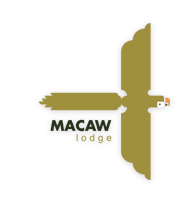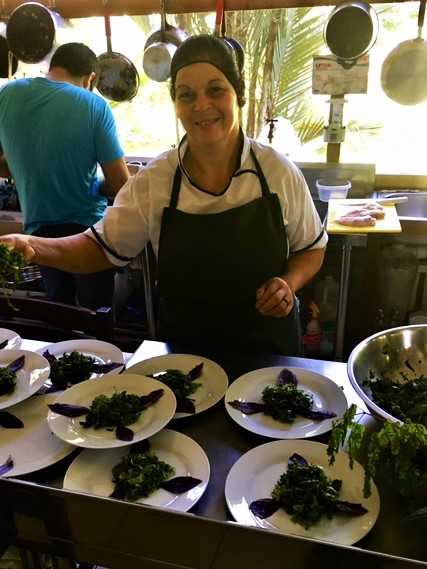MACAW NEWS
Knowledge exchange with Surinamese Enviromental Congressmen
If there is a place where relaxation and learning meet and complement each other it is Macaw Lodge. Visitors come seeking nature: colorful birds, exotic trees, and the sounds of a distant waterfall. Coming all the way up Costa Rica’s Central Pacific coastal mountain to this unique ecohotel provides anyone with the perfect disconnection from city life. From yoga retreats to permaculture workshops, the environment and design of the place alongside it’s dedicated staff always provides a complete experience: culinary to educational, guests return satisfied and inspired.
The first Sunday of the year 2018, Macaw Lodge hosts a group of Surinamese Congressmen accompanied by and guided around Costa Rica by Carlos Rodríguez, ex Minister of Environment. He represents Conservation International, an NGO that as the name suggests, focuses on conservation all over the world. They have already worked with 35 countries in the 30 years they have existed and focus on working on efforts towards conserving biodiversity. Today, they bring Surinamese politicians to Macaw Lodge with the purpose of a knowledge exchange between founder and owner Pablo Gordienko, an expert in agroforestation, Mr. Rodríguez as part of Conservation International and the Surinamese government representatives. This program of CI seeks to support politicians in the making and implementation of environmental laws and politics.
Surinam is a country that could become as famous and successful as Costa Rica in regards to ecotourism. The smallest country in South America, it’s biodiversity just nearly as rich: from sea turtles, rare insects and snakes to jaguars and tapirs. In 2000, UNESCO (United Nations Educational, Scientific and Cultural Organization) declared the Natural Reserve of Central Surinam as a World Heritage. Just over 90% of this pristine jungle is untouched by humans. Conservation attempts are not as strong and comprehensive as Costa Rica’s but they are starting to grow.
Around noon, the dining table at Macaw Lodge is colorfully decorated and ready to receive guests. A gentle breeze flows over the lake and brings some cool to the midday heat. The view from the lodge is a well designed landscape of trees and plants ranging from green and yellow to purple and brown. Hummingbirds a few feet from the chairs add even more color and natural beauty to the environment of this evening. Warm greetings are exchanged with the freshly arrived Surinamese delegation and everyone gathers around plates that offer a salad with kale, moringa, spinach and tomatos fresh from the grounds of Macaw’s farm. Lunch also includes rice, squash and other vegetables grown and harvested from the same earth.
Naturally the dialogue takes that route, and each gives their interpretation of spicy, comparing local chilero to the peppers and spices used to in the condiment Roti back in Surinam. Then climate is discussed as similar but different: one degree North of the Equator, Surinam is even more tropical than Costa Rica. The Surinam rainy season brings an incredible amount of water to their forests and jungles and with this humidity, biodiversity is abundant and unique. Recently discovered and worth mentioning is the cocoa frog.
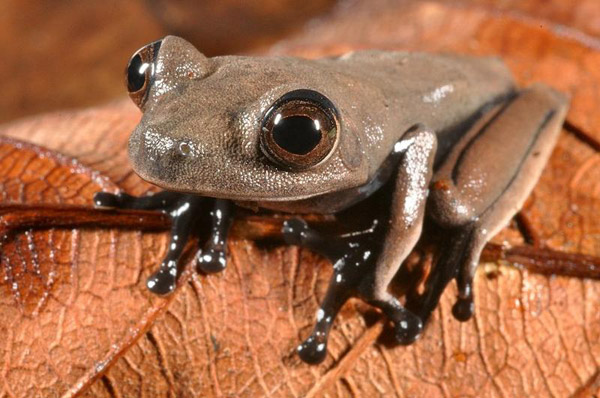
The topic of the day is reached, and Rodríguez explains how the carbon market in such countries has a lot of potential. He emphasizes on the importance of choosing the correct market. “It is not logical to compete with China or Brazil, one must aim for a premium market, credits can be created and accumulated. High quality carbon will acquire value in the upcoming years and our countries should be aiming to invest in these. In Costa Rica and the rest of the Americas this is happenning with coffee. It is predicted that in 2050 between 60% and 80% of Latin America’s coffee zones, and hence their production, will be affected by the increase in global temperatures. In the end, you must create a niche market, where coffee or the local product has its own brand.”

Gordienko, who specialized and is highly devoted to agroforestry and other environmental issues, explains about his case. Thirty years ago, environmental laws and climate were different. What used to be farmland with a few cows, he envisions and decides to invest in reforestation, planting different species from all over the world. At the end of the seventies, interestingly enough, Costa Rica had one of the world’s highest deforestation rates. Law 7575 was implemented soon after and incentives to plant where the government paid per tree helped avoid and change the country’s richness’s fate. Gordienko believes and promotes agroforestry (agroforestation) systems, where agriculture and forest systems are one.
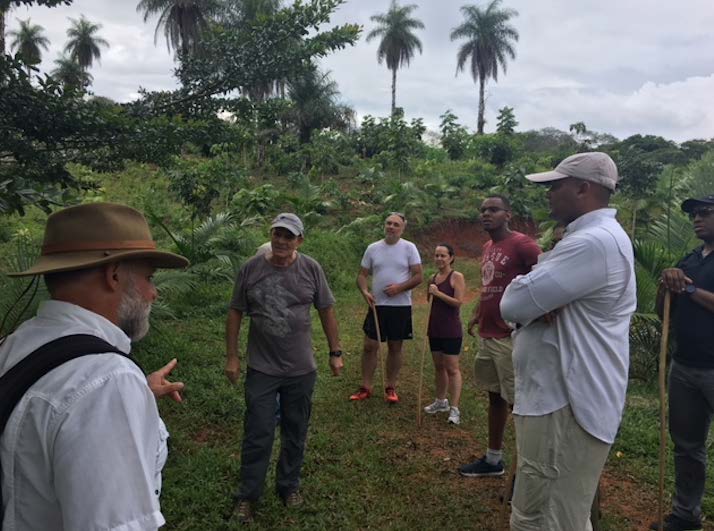
At Macaw, one of the highlights is cacao, a plant that benefits the environment as well as humans. The idea of agroforestry systems is also discussed and advocated by the National Fund of Forestry Finance (Fondo Nacional de Financiamiento Forestal). Costa Rica’s government is dedicated to protecting the environment and this endeavor reaches topics and places as far as they can.
In an agroforestry system, a 170 hectare land can make up to $8,000 in a year, which can make a difference in low income areas. FONAFIFO as well as Conservation International have pushed to show the importance of conservation, how the stronger simbiosis between human and nature the more benefits are given to all. Conservation can have and has had in many cases a high impact in low income communities. This is a message that not only Surinam and Costa Rica have to learn from.

Winston Ramotarsing, a Surinamese Congressman, describes the situation: “So far the government has decided to protect the forest and our green areas, but specific programs to protect the environment do not exist yet, and there is not much talk about sustainability. Our point of interest with Conservation International and coming to Costa Rica is this: learning how to create and implement a program that benefits the people. We are looking at examples from all over the world.”
Surinam has the resources, but it is a few steps behind from Costa Rica. When Grace Watamaleo is asked if she imagines this model applied to her country, she takes her time to respond. Looking around the cacao plantation surrounding the group she exclaims: “It is possible. The institution is in place. Legislation has to be more organized.” Every member seems to have some form of inspiration, and it is clear they will take these ideas back to their home to try and change the situation.

How are people involved?
Asiskumar Gajadien says this is the big problem, that people are not aware. It is not ignorance, since we all know and see the trees and animals around us, but we are not yet aware of their value, of the importance of conserving. There is a necessity to educate. “as long as they don’t feel, they won’t know.” The effoct has to come in this side, through education and exposure, consciousness can be created and respect for nature fostered.
Rowan Braybrook as a representative of Conservation International explains that this knowledge exchange is very important between countries of similar resources and climates. The lessons that legislators can adapt and apply to their own governments are invaluable. A well implemented law can bring tremendous benefits. The idea is that this model is financially sustainable in Surinam.
Lastly, Jerry A-Kum adds on his expectation that there is a higher utility of nature for tourism purposes. He wants to present alternatives to his people to enhance sustainability. Additionally the goal is to create consciousness, but also that it is financially benefitial. “Costa Rica is a great example of reinventing the wheel.”
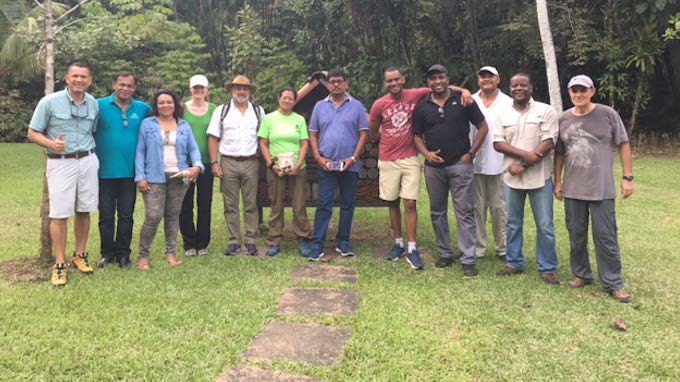
Ready to visit? To plan your travel and your stay, please feel free to reach out to us:
Email: travel@macawlodge.com
Whatsapp: +506 8762 9090
Phone: +506 8310 9073
Written by Gabriela Mateo
